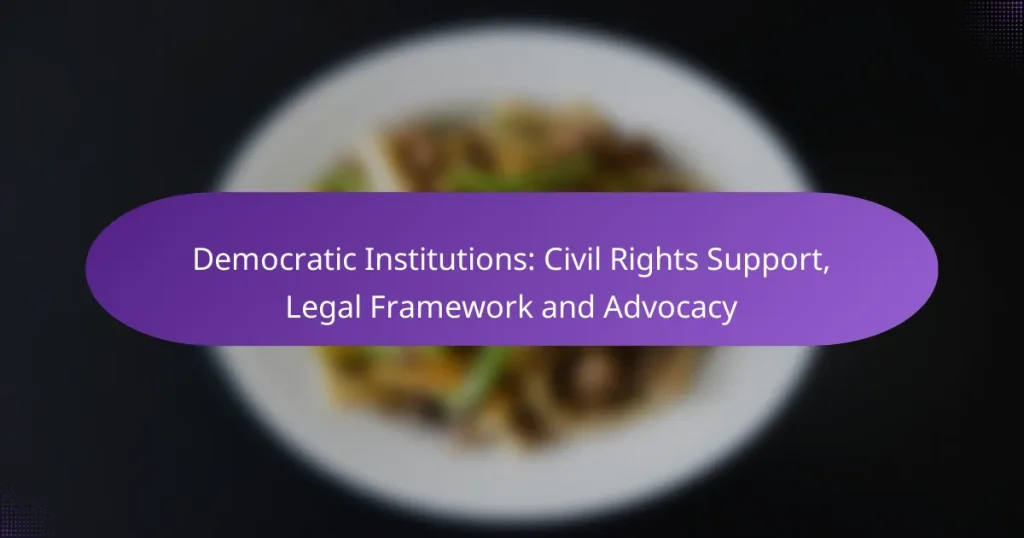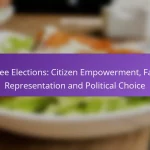Democratic institutions are essential in upholding civil rights by providing a robust legal framework that safeguards individual freedoms and promotes equality. Through constitutional provisions, international treaties, and advocacy efforts, these institutions empower citizens to actively engage in governance and protect the rights of marginalized communities.
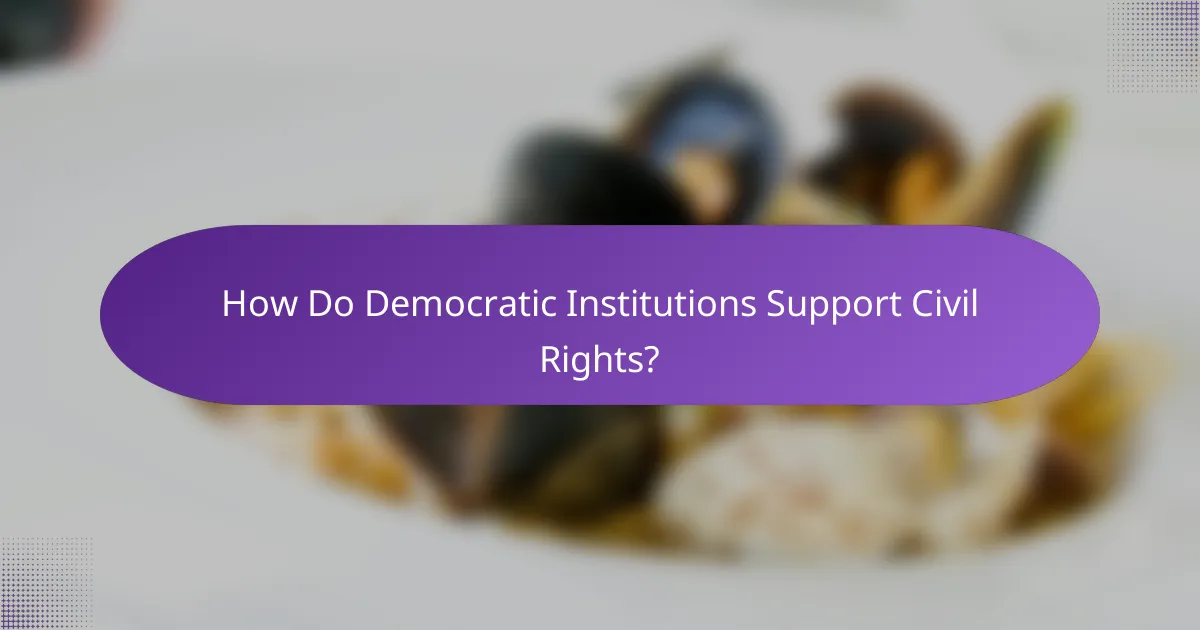
How Do Democratic Institutions Support Civil Rights?
Democratic institutions play a crucial role in supporting civil rights by establishing a framework that protects individual freedoms, promotes equality, and ensures accountability. These institutions create legal structures and advocacy channels that empower citizens to exercise their rights and participate in governance.
Protection of individual freedoms
Democratic institutions safeguard individual freedoms through constitutional protections and laws that prohibit discrimination and abuse. For example, freedom of speech, assembly, and religion are often enshrined in national constitutions, allowing citizens to express themselves without fear of repression.
Additionally, these institutions provide mechanisms for individuals to challenge violations of their rights, such as through courts or human rights commissions. This legal recourse is vital for maintaining personal liberties and ensuring that government actions do not infringe upon individual rights.
Promotion of equality
Equality is a fundamental principle in democratic societies, and institutions work to eliminate disparities based on race, gender, or socioeconomic status. Laws and policies aimed at promoting equal opportunities in education, employment, and healthcare are essential for fostering an inclusive society.
Moreover, advocacy groups often collaborate with democratic institutions to highlight issues of inequality and push for reforms. This partnership can lead to significant legislative changes that enhance civil rights protections for marginalized communities.
Facilitation of public participation
Democratic institutions encourage public participation by providing platforms for citizens to engage in the political process. This includes voting in elections, attending town hall meetings, and participating in public consultations on policy matters.
By facilitating these avenues, institutions ensure that diverse voices are heard, which can lead to more representative governance. Engaging citizens in decision-making processes helps to build trust and accountability within the system.
Accountability mechanisms
Accountability mechanisms are essential for ensuring that government officials and institutions adhere to civil rights standards. This includes independent oversight bodies that monitor government actions and investigate complaints of rights violations.
For instance, ombudsman offices and anti-corruption agencies play a critical role in holding public officials accountable. These mechanisms help to deter misconduct and promote transparency in governance.
Judicial oversight
Judicial oversight is a key component of democratic institutions, providing a check on the powers of the executive and legislative branches. Courts interpret laws and adjudicate disputes related to civil rights, ensuring that individuals can seek justice when their rights are infringed.
The independence of the judiciary is vital for maintaining the rule of law and protecting civil liberties. In many democracies, courts have the authority to strike down laws or actions that violate constitutional rights, reinforcing the importance of judicial review in safeguarding civil rights.
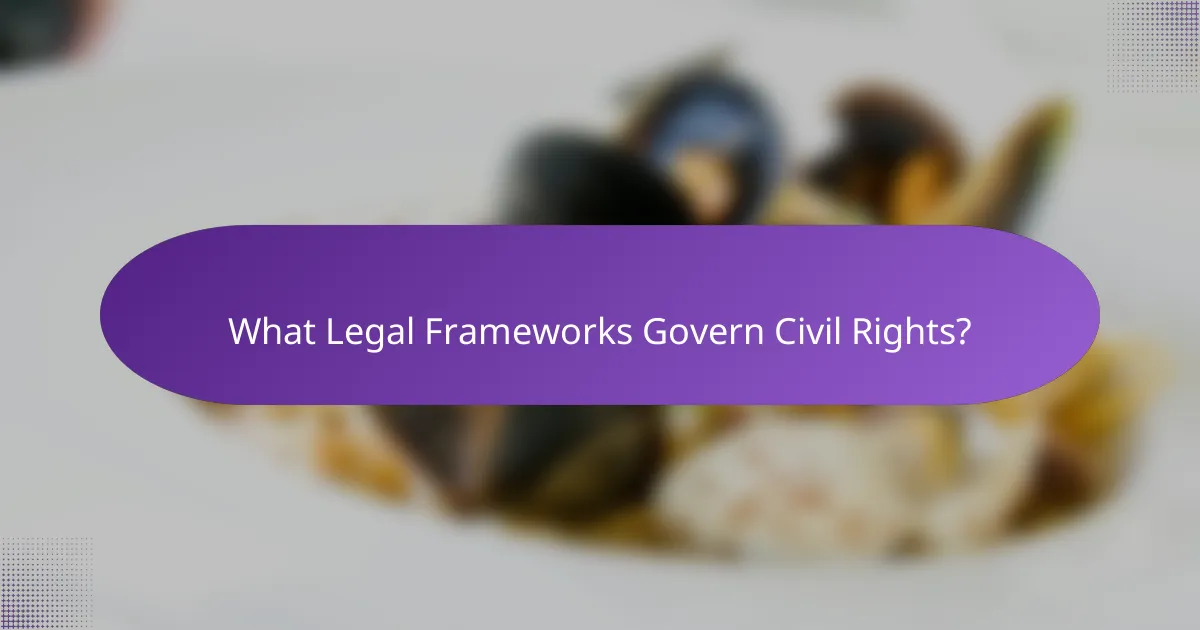
What Legal Frameworks Govern Civil Rights?
Legal frameworks governing civil rights consist of constitutional provisions, international treaties, national legislation, and case law precedents. These frameworks establish the rights and protections afforded to individuals, ensuring their freedoms and equality under the law.
Constitutional provisions
Constitutional provisions are fundamental laws that outline the civil rights of citizens within a country. For example, in the United States, the Bill of Rights guarantees essential freedoms such as speech, assembly, and religion. These provisions serve as the cornerstone for civil rights protection and often guide judicial interpretations.
In many countries, constitutions also include clauses that prohibit discrimination based on race, gender, or religion, reinforcing the commitment to equality. Understanding these provisions is crucial for individuals seeking to assert their rights.
International treaties
International treaties play a significant role in shaping civil rights standards globally. Agreements such as the Universal Declaration of Human Rights and the International Covenant on Civil and Political Rights set benchmarks for member states to uphold civil liberties. Countries that ratify these treaties are often held accountable for their adherence to these principles.
These treaties can influence domestic laws and policies, encouraging nations to align their legal frameworks with international human rights standards. Individuals can reference these treaties when advocating for their rights on a global scale.
National legislation
National legislation encompasses laws enacted by a country’s legislative body to protect civil rights. These laws can cover a wide range of issues, including anti-discrimination laws, voting rights, and labor rights. For instance, the Civil Rights Act in the United States prohibits discrimination based on race, color, religion, sex, or national origin.
It is essential for citizens to be aware of their national laws, as these provide specific protections and remedies for civil rights violations. Engaging with local advocacy groups can help individuals navigate these legal frameworks effectively.
Case law precedents
Case law precedents are judicial decisions that interpret and apply constitutional provisions and legislation regarding civil rights. These rulings can set important legal standards and clarify ambiguities in the law. For example, landmark Supreme Court cases like Brown v. Board of Education have had profound impacts on civil rights by addressing segregation in schools.
Understanding relevant case law is vital for individuals and advocates, as these precedents can influence ongoing legal battles and shape future interpretations of civil rights protections. Keeping abreast of recent rulings can provide insights into the evolving landscape of civil rights law.
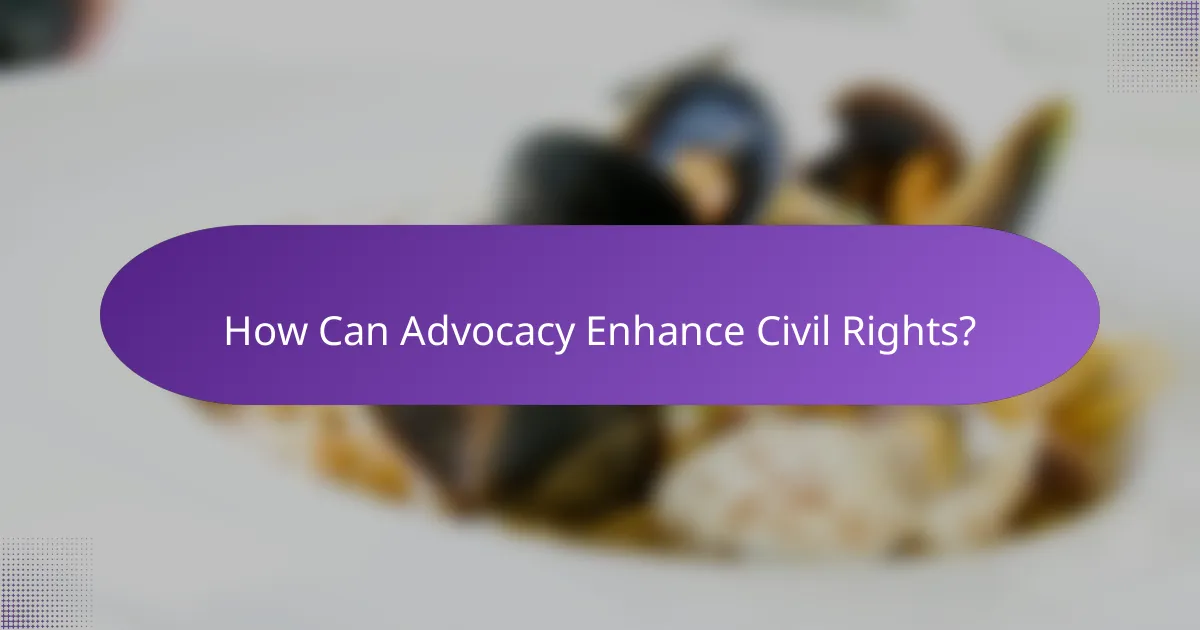
How Can Advocacy Enhance Civil Rights?
Advocacy plays a crucial role in enhancing civil rights by mobilizing communities, raising public awareness, providing legal support, and influencing policy changes. These efforts help to protect and promote the rights of marginalized groups, ensuring that their voices are heard and their needs are addressed.
Grassroots mobilization
Grassroots mobilization involves organizing community members to take collective action for civil rights. This can include rallies, community meetings, and local campaigns that empower individuals to advocate for their rights. Effective grassroots efforts often rely on building strong networks and fostering relationships among community members.
To maximize impact, grassroots organizations should focus on clear messaging and inclusive participation. Engaging diverse groups ensures that various perspectives are represented, which can strengthen the overall movement.
Public awareness campaigns
Public awareness campaigns aim to educate the broader community about civil rights issues and promote social change. These campaigns can utilize various media platforms, including social media, television, and print, to reach a wide audience. The goal is to inform the public about injustices and mobilize support for civil rights initiatives.
Successful campaigns often feature compelling stories and relatable content that resonate with the audience. Collaborating with local influencers or organizations can also enhance visibility and credibility, increasing the campaign’s effectiveness.
Legal representation
Legal representation is essential for individuals facing civil rights violations, as it provides them with the necessary support to navigate the legal system. Advocates can assist in filing complaints, representing clients in court, and ensuring that their rights are upheld. Access to legal resources can significantly impact the outcomes of civil rights cases.
Organizations offering legal aid often focus on specific issues, such as discrimination or housing rights. It is crucial for individuals to seek out these resources to receive appropriate guidance and support tailored to their circumstances.
Lobbying for policy change
Lobbying for policy change involves advocating for new laws or amendments that protect civil rights at various levels of government. This process typically includes meeting with lawmakers, providing testimony, and mobilizing public support to influence decision-makers. Effective lobbying requires a clear understanding of the legislative process and the specific changes needed.
Advocates should prepare well-researched proposals and engage with stakeholders to build coalitions that support their initiatives. Continuous follow-up and communication with legislators can help maintain momentum and ensure that civil rights remain a priority in policy discussions.
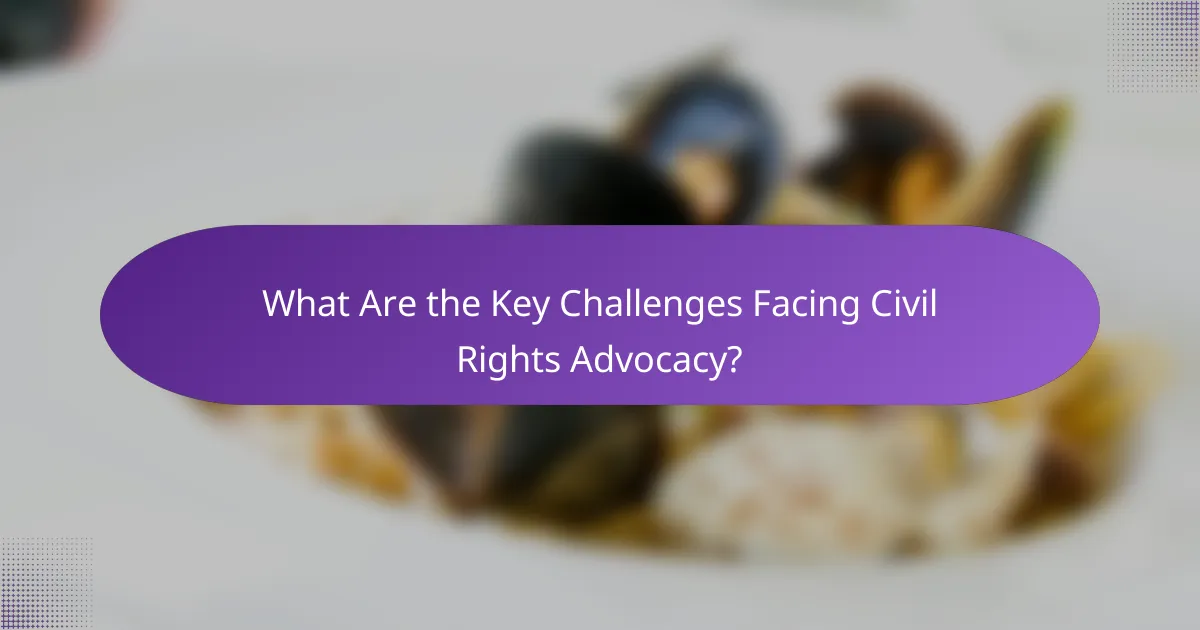
What Are the Key Challenges Facing Civil Rights Advocacy?
Civil rights advocacy faces several significant challenges that hinder its effectiveness, including political resistance, resource limitations, public apathy, and legal barriers. Each of these factors can obstruct progress and undermine efforts to promote equality and justice.
Political resistance
Political resistance is a major obstacle for civil rights advocacy, often stemming from policymakers who may prioritize other agendas or lack commitment to civil rights issues. This resistance can manifest in the form of legislation that undermines protections or fails to support necessary reforms.
Advocates must navigate a complex political landscape, building coalitions and engaging in lobbying efforts to counteract opposition. Effective strategies include grassroots mobilization and public awareness campaigns to shift political will towards supporting civil rights initiatives.
Resource limitations
Resource limitations significantly impact the capacity of civil rights organizations to operate effectively. Many advocacy groups rely on donations, grants, and volunteer support, which can fluctuate and create instability in funding.
To address these limitations, organizations should diversify funding sources and develop sustainable fundraising strategies. Collaborating with other groups can also help pool resources and share expertise, enhancing overall effectiveness in advocacy efforts.
Public apathy
Public apathy towards civil rights issues can hinder advocacy efforts, as a disengaged populace may not prioritize or support necessary reforms. This lack of interest can stem from misinformation, lack of awareness, or a belief that civil rights issues do not affect them personally.
To combat apathy, advocates should focus on education and outreach, using social media and community events to raise awareness about the importance of civil rights. Engaging stories and relatable messaging can help connect the public to these issues, fostering a sense of urgency and responsibility.
Legal barriers
Legal barriers present significant challenges to civil rights advocacy, often arising from outdated laws or judicial interpretations that limit protections. These barriers can make it difficult for advocates to pursue justice and enforce civil rights effectively.
Advocates should be well-versed in existing laws and regulations, identifying areas where reform is needed. Strategic litigation can also be a powerful tool, using the courts to challenge unjust laws and set precedents that advance civil rights protections.
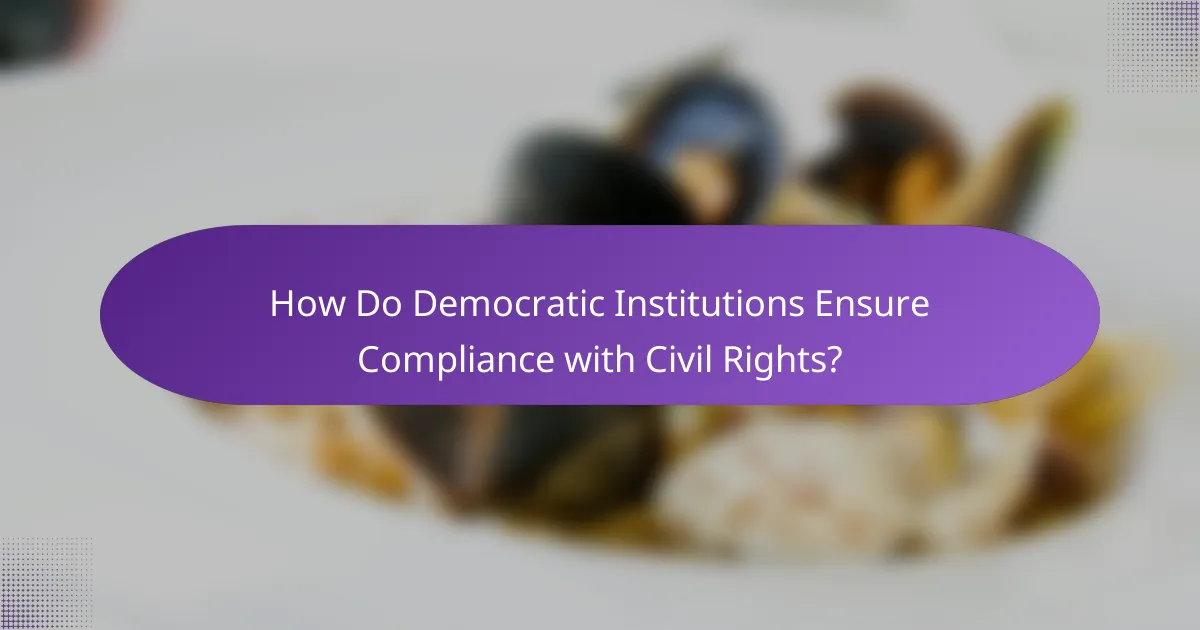
How Do Democratic Institutions Ensure Compliance with Civil Rights?
Democratic institutions ensure compliance with civil rights by establishing legal frameworks, monitoring systems, and advocacy efforts that protect individual freedoms. These mechanisms work together to uphold the rule of law and promote accountability within society.
Monitoring and reporting
Monitoring and reporting are essential functions of democratic institutions to track compliance with civil rights. These processes involve collecting data on human rights practices, assessing the effectiveness of laws, and identifying areas needing improvement.
Institutions like human rights commissions and independent watchdog organizations play a crucial role in this monitoring. They often publish reports that highlight violations, recommend policy changes, and provide a basis for public accountability.
For effective monitoring, it is important to establish clear indicators of civil rights compliance. These can include metrics such as the number of reported abuses, the responsiveness of law enforcement, and public access to legal resources. Regular assessments help ensure that civil rights remain a priority in governance.
